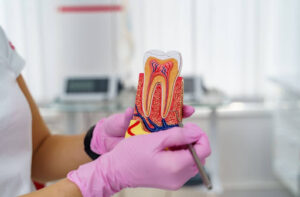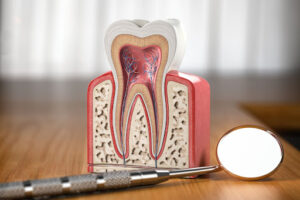Tooth loss can affect more than just your appearance. It impacts the way you eat, speak, and feel about yourself. Whether it’s due to age, injury, or decay, missing teeth can make daily life harder. That’s where dental implants come in.
Dental implants offer a reliable and long-term solution for replacing missing teeth. They look and feel like natural teeth. The procedure has evolved over the years and is now considered one of the most effective methods for restoring smiles.
If you’re searching for the best dentist near you, it’s important to find someone who has experience with implant procedures and understands your specific needs.
How Dental Implants Work – Step by Step
Dental implants may seem complex, but the process is carefully planned and carried out in stages.
Here’s a breakdown of the procedure:
Initial Consultation
- X-rays and oral examination
- Check bone structure and gum health
- Discussion of goals and concerns
Tooth Extraction (if needed)
- Damaged or decayed teeth are removed
- Healing time may be needed before implant placement
Implant Placement
- A titanium post is surgically placed into the jawbone
- Acts like a root for the new tooth
- Healing period allows the implant to fuse with the bone (osseointegration)
Abutment Attachment
- A small connector is placed on top of the implant
- It holds the artificial tooth or crown
Crown Placement
- A custom-made crown is fixed on the abutment
- Matches the shape and color of your natural teeth
The full process may take a few months, depending on healing and additional treatments. But the results are strong, stable, and long-lasting. Consulting a dental implant specialist ensures you receive personalized care tailored to your needs.
Why Implants Stand Out from Other Options
Not all tooth replacement options are created equal. Dental implants offer several unique advantages.
Key reasons people choose implants:
Natural Look and Feel
- Implants are designed to look just like real teeth
- They feel comfortable and secure in the mouth
Durability
- With proper care, they can last for decades
- No need for frequent replacements
No Impact on Nearby Teeth
- Unlike bridges, implants don’t require grinding down surrounding teeth
Better Bone Health
- Helps prevent jawbone shrinkage caused by missing teeth
Improved Speech and Chewing
- Eliminates the discomfort and slipping of dentures
Dental implants not only restore the smile but also improve oral function and preserve facial structure. They offer a more permanent solution compared to dentures or bridges.
Cost Factors You Should Know About
Many patients ask about cost, and rightfully so. Implants are an investment — but they’re built to last.
Here are the key cost factors:
Number of Implants Needed
- Single, multiple, or full mouth restoration
Location of the Clinic
- Prices can vary based on the region and demand
Additional Procedures
- Bone grafting, sinus lifts, or extractions can add to the total
Type of Crown Used
- Materials like porcelain or zirconia have different pricing
While implants may cost more upfront than other options, their longevity can make them more affordable in the long run. Talk to the best dentist near you to understand what’s included in the quote.
Is Everyone a Candidate for Dental Implants?
Dental implants are a strong option, but they’re not for everyone.
A few things your dentist will check before recommending implants:
Healthy Gums
- Implants need strong, infection-free gums
Sufficient Jawbone
- Bone needs to be thick enough to hold the implant
- Bone grafting may be needed if bone is too thin
Overall Health
- Chronic conditions like uncontrolled diabetes can affect healing
Non-smoker or Willing to Quit
- Smoking slows healing and increases implant failure risk
If any concerns come up, your dentist might suggest steps to prepare your mouth and body before the procedure.
How to Care for Your Implants After the Procedure
Once your implants are in place, the work isn’t over. Proper care is the key to keeping them in great shape.
Post-care tips for maintaining dental implants:
Brush and Floss Daily
- Treat implants like your natural teeth
- Use a soft-bristled toothbrush
Avoid Hard Foods
- Especially during the healing period
- Nuts, ice, or hard candy can cause damage
Regular Checkups
- Visit your dentist twice a year
- Early detection helps prevent implant failure
No Smoking
- Smoking can slow healing and increase infection risk
Taking care of implants is straightforward — good oral hygiene and regular checkups go a long way. Always follow the advice of your tooth implant doctor to ensure the best long-term results.
Common Questions Patients Ask
Dental implants raise a lot of questions, especially for first-timers.
A few questions that often come up:
Is the procedure painful?
- Most people say it’s less painful than a tooth extraction
- Local anesthesia is used during surgery
How long does healing take?
- Typically 3 to 6 months for full healing
- This allows the implant to fuse with the jawbone
Can implants fail?
- Rare, but possible if post-care is ignored
- Regular dental visits help catch issues early
Are they safe for seniors?
- Yes. Age is not a barrier if overall health is stable
The Path to a Confident Smile
Tooth loss doesn’t have to be permanent. Dental implants give you the chance to eat, speak, and smile with renewed confidence.
If you’re in San Antonio searching for the best dentist near you, look for a practice that offers clear guidance, skilled care, and personalized treatment plans.
While getting dental implants requires time and effort, the results are long-lasting. They don’t just restore your teeth — they help you regain your sense of self.
For reliable, dentist-supervised dental implants in San Antonio, consider SA Family Dentist.






